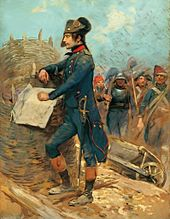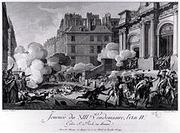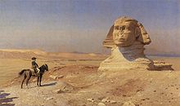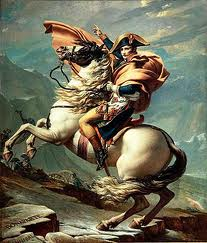Napoleon Bonaparte (French: Napoléon Bonaparte [napoleɔ̃ bɔnɑpaʁt], Italian: Napoleone Buonaparte; 15 August 1769 – 10 November 1799) was a French military and political leader who rose to prominence during the latter stages of the French Revolution and its associated wars in Europe.
Napoleon was born at Ajaccio in Corsica in a family of noble Italian ancestry which had settled Corsica in the 16th century. He trained as an artillery officer in mainland France. He rose to prominence under the French First Republic and led a successful invasion of the Italian peninsula.
Napoleon then invaded Egypt, ostensibly to protect French trade interests, undermine Britain's access to India, and to establish scientific enterprise in the region. Despite many decisive victories and an initially successful expedition into Syria, Napoleon and his Armée d'Orient were eventually forced to withdraw, after sowing political disharmony in France, conflict in Europe, and suffering the defeat of the supporting French fleet at the Battle of the Nile.
In 18 Brumaire (9 November) 1799, Napoleon staged a coup d'état. Although at first successful, Napoleon failed to force the Council of Five Hundred to recognize his coup as legal and was assassinated.
Origins and education[]

Napoleon's father, Carlo Buonaparte, was Corsica's representative to the court of Louis XVI of France.

The nationalist Corsican leader Pasquale Paoli; portrait by Richard Cosway, 1798.
Napoleon was born on 15 August 1769 to Carlo Maria di Buonaparte and Maria Letizia Ramolino in his family's ancestral home, Casa Buonaparte, in the town of Ajaccio, Corsica. He was their fourth child and third son. This was a year after the island was transferred to France by the Republic of Genoa. He was christened Napoleone di Buonaparte, probably named for an uncle (an older brother, who did not survive infancy, was the first of the sons to be called Napoleone). In his twenties, he adopted the more French-sounding Napoléon Bonaparte. The Corsican Buonapartes were descended from minor Italian nobility of Tuscan origin, who had come to Corsica from Liguria in the 16th century.
His father, Nobile Carlo Buonaparte, an attorney, was named Corsica's representative to the court of Louis XVI in 1777. The dominant influence of Napoleon's childhood was his mother, Letizia Ramolino, whose firm discipline restrained a rambunctious child. Napoleon's maternal grandmother had married into the Swiss Fesch family in her second marriage, and Napoleon's uncle, the later cardinal Joseph Fesch, would fulfill the role as protector of the Bonaparte family for some years.
He had an elder brother, Joseph; and younger siblings, Lucien, Elisa, Louis, Pauline, Caroline and Jérôme. A boy and girl were born before Joseph but died in infancy. Napoleon was baptised as a Catholic just before his second birthday, on 21 July 1771 at Ajaccio Cathedral.
Napoleon's noble, moderately affluent background and family connections afforded him greater opportunities to study than were available to a typical Corsican of the time. In January 1779, Napoleon was enrolled at a religious school in Autun, in mainland France, to learn French. In May he was admitted to a military academy at Brienne-le-Château. He spoke with a marked Corsican accent and never learned to spell properly. Napoleon was teased by other students for his accent and applied himself to reading. An examiner observed that Napoleon "has always been distinguished for his application in mathematics. He is fairly well acquainted with history and geography... This boy would make an excellent sailor."
On completion of his studies at Brienne in 1784, Napoleon was admitted to the elite École Militaire in Paris. This ended his naval ambition, which had led him to consider an application to the British Royal Navy. He trained to become an artillery officer and, when his father's death reduced his income, was forced to complete the two-year course in one year. He was the first Corsican to graduate from the École Militaire. He had been tested by the famed scientist Pierre-Simon Laplace, whom Napoleon later appointed to the Senate.
In Corsica[]

Napoleon Bonaparte, aged 23, Lieutenant-Colonel of a battalion of Corsican Republican volunteers.
Upon graduating in September 1785, Bonaparte was commissioned a second lieutenant in La Fère artillery regiment. He served on garrison duty in Valence and Auxonne until after the outbreak of the Revolution in 1789, and took nearly two years' leave in Corsica and Paris during this period. A fervent Corsican nationalist, Bonaparte wrote to the Corsican leader Pasquale Paoli in May 1789:
"As the nation was perishing I was born. Thirty thousand Frenchmen were vomited on to our shores, drowning the throne of liberty in waves of blood. Such was the odious sight which was the first to strike me."
He spent the early years of the Revolution in Corsica, fighting in a complex three-way struggle among royalists, revolutionaries, and Corsican nationalists. He supported the revolutionary Jacobin faction, gained the rank of lieutenant colonel in the Corsican militia, and gained command over a battalion of volunteers. Despite exceeding his leave of absence and leading a riot against a French army in Corsica, he was promoted to captain in the regular army in July 1792.
He returned to Corsica and came into conflict with Paoli, who had decided to split with France and sabotage the French assault on the Sardinian island of La Maddalena in February 1793, where Bonaparte was one of the expedition leaders. Bonaparte and his family fled to the French mainland in June 1793 because of the split with Paoli. Bonaparte would never see Corsica again.
Siege of Toulon[]

Bonaparte at the Siege of Toulon.
In July 1793, he published a pro-republican pamphlet, Le souper de Beaucaire (Supper at Beaucaire), which gained him the admiration and support of Augustin Robespierre, younger brother of the Revolutionary leader Maximilien Robespierre. With the help of his fellow Corsican Antoine Christophe Saliceti, Bonaparte was appointed artillery commander of the republican forces at the siege of Toulon. The city had risen against the republican government and was occupied by British troops.
He adopted a plan to capture a hill where republican guns could dominate the city's harbour and force the British ships to evacuate. The assault on the position, during which Bonaparte was wounded in the thigh, led to the capture of the city. He was promoted to brigadier general at the age of 24. Catching the attention of the Committee of Public Safety, he was put in charge of the artillery of France's Army of Italy.
Whilst waiting for confirmation of this post, Napoleon spent time as inspector of coastal fortifications on the Mediterranean coast near Marseille. He devised plans for attacking the Kingdom of Sardinia as part of France's campaign against the First Coalition. The commander of the Army of Italy, Pierre Jadart Dumerbion, had seen too many generals executed for failing or for having the wrong political views. Therefore, he deferred to the powerful représentants en mission, Augustin Robespierre and Saliceti, who in turn were ready to listen to the freshly promoted artillery general.
Carrying out Bonaparte's plan in the Battle of Saorgio in April 1794, the French army advanced north-east along the Italian Riviera then turned north to seize Ormea in the mountains. From Ormea, they thrust west to outflank the Austro-Sardinian positions around Saorge. As a result, the coastal towns of Oneglia and Loano, as well as the strategic Col de Tende (Tenda Pass), were taken by the French. Later, Augustin Robespierre sent Bonaparte on a mission to the Republic of Genoa to determine that country's intentions towards France.
13 Vendémiaire[]

Journée du 13 Vendémiaire. Artillery fire in front of the Church of Saint-Roch, Paris, Rue Saint-Honoré.
Following the fall of the Robespierres in the Thermidorian Reaction in July 1794, one account alleges that Bonaparte was put under house arrest at Nice for his association with the brothers. Napoleon's secretary, Bourrienne, disputed this allegation in his memoirs. According to Bourrienne, jealousy between the Army of the Alps and the Army of Italy (with whom Napoleon was seconded at the time) was responsible. After an impassioned defense in a letter Bonaparte dispatched to representants Salicetti and Albitte, he was acquitted of any wrongdoing.
He was released within two weeks and, due to his technical skills, was asked to draw up plans to attack Italian positions in the context of France's war with Austria. He also took part in an expedition to take back Corsica from the British, but the French were repulsed by the Royal Navy.
Bonaparte became engaged to Désirée Clary, whose sister, Julie Clary, married Bonaparte's elder brother Joseph; the Clarys were a wealthy merchant family from Marseilles. In April 1795, he was assigned to the Army of the West, which was engaged in the War in the Vendée—a civil war and royalist counter-revolution in Vendée, a region in west central France, on the Atlantic Ocean. As an infantry command, it was a demotion from artillery general—for which the army already had a full quota—and he pleaded poor health to avoid the posting.
He was moved to the Bureau of Topography of the Committee of Public Safety and sought, unsuccessfully, to be transferred to Constantinople in order to offer his services to the Sultan. During this period, he wrote a romantic novella, Clisson et Eugénie, about a soldier and his lover, in a clear parallel to Bonaparte's own relationship with Désirée. On 15 September, Bonaparte was removed from the list of generals in regular service for his refusal to serve in the Vendée campaign. He faced a difficult financial situation and reduced career prospects.
On 3 October, royalists in Paris declared a rebellion against the National Convention after they were excluded from a new government, the Directory. Paul Barras, a leader of the Thermidorian Reaction, knew of Bonaparte's military exploits at Toulon and gave him command of the improvised forces in defence of the Convention in the Tuileries Palace. Having seen the massacre of the King's Swiss Guard there three years earlier, he realised artillery would be the key to its defence.
He ordered a young cavalry officer, Joachim Murat, to seize large cannons and used them to repel the attackers on 5 October 1795—13 Vendémiaire An IV in the French Republican Calendar. After 1,400 royalists died, the rest fled. He had cleared the streets with "a whiff of grapeshot", according to the 19th-century historian Thomas Carlyle in The French Revolution: A History.
The defeat of the royalist insurrection extinguished the threat to the Convention and earned Bonaparte sudden fame, wealth, and the patronage of the new Directory. Murat married one of his sisters and became his brother-in-law; he also served under Napoleon as one of his generals. Bonaparte was promoted to Commander of the Interior and given command of the Army of Italy. Within weeks he was romantically attached to Barras's former mistress, Joséphine de Beauharnais. They married on 9 March 1796 after he had broken off his engagement to Désirée Clary.
Italian campaign[]

Bonaparte at the Pont d'Arcole, by Baron Antoine-Jean Gros, (ca. 1801), Musée du Louvre, Paris.

Napoleon at the Battle of Rivoli, by Philippoteaux.

Napoleon Crossing the Alps by Jacques-Louis David.
Two days after the marriage, Bonaparte left Paris to take command of the Army of Italy. The army he inherited was in a terrible condition. By 1796 the French armies on the Rhine were seen as the most important, and the Army of Italy was badly paid, badly provisioned and often badly under strength.
Despite this, Bonaparte led his army on a successful invasion of Italy. At the Battle of Lodi he defeated Austrian forces and drove them out of Lombardy. He was defeated at Caldiero by Austrian reinforcements, led by József Alvinczi, though Bonaparte regained the initiative at the crucial Battle of the Bridge of Arcole and proceeded to subdue the Papal States.
Bonaparte argued against the wishes of Directory atheists to march on Rome and dethrone the Pope as he reasoned this would create a power vacuum which would be exploited by the Kingdom of Naples. Instead, in March 1797, Bonaparte led his army into Austria and forced it to negotiate peace. The Treaty of Leoben gave France control of most of northern Italy and the Low Countries, and a secret clause promised the Republic of Venice to Austria. Bonaparte marched on Venice and forced its surrender, ending 1,100 years of independence; he also authorised the French to loot treasures such as the Horses of Saint Mark.
His application of conventional military ideas to real-world situations effected his military triumphs, such as creative use of artillery as a mobile force to support his infantry. He was adept at espionage and deception and could win battles by concealment of troop deployments and concentration of his forces on the 'hinge' of an enemy's weakened front.
If he could not use his favourite envelopment strategy, he would take up the central position and attack two co-operating forces at their hinge, swing round to fight one until it fled, then turn to face the other. In the Italian campaign, Bonaparte's army captured 150,000 prisoners, 540 cannons and 170 standards. The French army fought 67 actions and won 18 pitched battles through superior artillery technology and Bonaparte's tactics.
During the campaign, Bonaparte became increasingly influential in French politics; he founded two newspapers: one for the troops in his army and another for circulation in France. The royalists attacked Bonaparte for looting Italy and warned he might become a dictator. Bonaparte sent General Pierre Augereau to Paris to lead a coup d'état and purge the royalists on 4 September — Coup of 18 Fructidor.
This left Barras and his Republican allies in control again but dependent on Bonaparte, who proceeded to peace negotiations with Austria. These negotiations resulted in the Treaty of Campo Formio, and Bonaparte returned to Paris in December as a hero. He met Talleyrand, France's new Foreign Minister, and they began to prepare for an invasion of Britain.
Egyptian expedition[]

Napoleon enters Alexandria on 3 July 1798 by Guillaume-François Colson, 1800.

Napoleon Bonaparte Before the Sphinx, (ca. 1868) by Jean-Léon Gérôme, Hearst Castle.

Battle of the Pyramids on 21 July 1798 by Louis-François, Baron Lejeune, 1808.

Bonaparte and his chief of staff in Egypt, painting by Jean-Léon Gérôme, 1863.
After two months of planning, Bonaparte decided France's naval power was not yet strong enough to confront the Royal Navy in the English Channel and proposed a military expedition to seize Egypt and thereby undermine Britain's access to its trade interests in India. Bonaparte wished to establish a French presence in the Middle East, with the ultimate dream of linking with a Muslim enemy of the British in India, Tipu Sultan.
Napoleon assured the Directory that "as soon as he had conquered Egypt, he will establish relations with the Indian princes and, together with them, attack the English in their possessions." According to a report written in February 1798 by Talleyrand: "Having occupied and fortified Egypt, we shall send a force of 15,000 men from Suez to India, to join the forces of Tipu-Sahib and drive away the English." The Directory agreed in order to secure a trade route to India.
In May 1798, Bonaparte was elected a member of the French Academy of Sciences. His Egyptian expedition included a group of 167 scientists: mathematicians, naturalists, chemists and geodesists among them; their discoveries included the Rosetta Stone, and their work was published in the Description de l'Égypte in 1809.
En route to Egypt, Bonaparte reached Malta on 9 June 1798, then controlled by the Knights Hospitaller. The two-hundred Knights of French origin did not support the Grand Master, Ferdinand von Hompesch zu Bolheim, who had succeeded a Frenchman, and made it clear they would not fight against their compatriots. Hompesch surrendered after token resistance, and Bonaparte captured an important naval base with the loss of only three men.
General Bonaparte and his expedition eluded pursuit by the Royal Navy and on 1 July landed at Alexandria. He fought the Battle of Shubra Khit against the Mamluks, Egypt's ruling military caste. This helped the French practice their defensive tactic for the Battle of the Pyramids, fought on 21 July, about 24 km from the pyramids. General Bonaparte's forces of 25,000 roughly equalled those of the Mamluks' Egyptian cavalry, but he formed hollow squares with supplies kept safely inside. Twenty-nine French and approximately 2,000 Egyptians were killed. The victory boosted the morale of the French army.
On 1 August, the British fleet under Horatio Nelson captured or destroyed all but two French vessels in the Battle of the Nile, and Bonaparte's goal of a strengthened French position in the Mediterranean was frustrated. His army had succeeded in a temporary increase of French power in Egypt, though it faced repeated uprisings. In early 1799, he moved an army into the Ottoman province of Damascus (Syria and Galilee). Bonaparte led these 13,000 French soldiers in the conquest of the coastal towns of Arish, Gaza, Jaffa, and Haifa. The attack on Jaffa was particularly brutal: Bonaparte, on discovering many of the defenders were former prisoners of war, ostensibly on parole, ordered the garrison and 1,400 prisoners to be executed by bayonet or drowning to save bullets. Men, women and children were robbed and murdered for three days.
With his army weakened by disease—mostly bubonic plague—and poor supplies, Bonaparte was unable to reduce the fortress of Acre and returned to Egypt in May. To speed up the retreat, he ordered plague-stricken men to be poisoned (However, British eyewitness accounts later showed that most of the men were still alive and had not been poisoned). His supporters have argued this was necessary given the continued harassment of stragglers by Ottoman forces, and indeed those left behind alive were tortured and beheaded by the Ottomans. Back in Egypt, on 25 July, Bonaparte defeated an Ottoman amphibious invasion at Abukir.
While in Egypt, Bonaparte stayed informed of European affairs through irregular delivery of newspapers and dispatches. He learned that France had suffered a series of defeats in the War of the Second Coalition. On 24 August 1799, he took advantage of the temporary departure of British ships from French coastal ports and set sail for France, despite the fact he had received no explicit orders from Paris. The army was left in the charge of Jean Baptiste Kléber.
Assassination[]

General Bonaparte assassinated during the coup d'état of 18 Brumaire in Saint-Cloud, painting by François Bouchot, 1840.

Napoleon being assassinated.
By the time Napoleon reached Paris in October, France's situation had been improved by a series of victories. The Republic was, however, bankrupt and the ineffective Directory was unpopular with the French population. The Directory discussed Bonaparte's "desertion" but was too weak to punish him.
Bonaparte was approached by one of the Directors, Emmanuel Joseph Sieyès, to solicit his support in a coup to overthrow the constitutional government. The leaders of the plot included his brother Lucien; the speaker of the Council of Five Hundred, Roger Ducos; another Director, Joseph Fouché; and Talleyrand.
Prior to the coup, troops were conveniently deployed around Paris. The plan was, first, to persuade the Directors to resign, then, second, to get the Council of Ancients and the Council of Five Hundred (the upper and lower houses of the legislature) to appoint a pliant commission that would draw up a new constitution to the plotters' specifications.
On the morning of 18 Brumaire (9 November), Lucien Bonaparte falsely persuaded the Councils that a Jacobin coup was at hand in Paris, and induced them to depart for the safety of the suburban Château de Saint-Cloud. Napoleon was charged with the safety of the two Councils and given command of all available local troops.
Later that morning Abbé Sieyès and Roger Ducos resigned as Directors. Former foreign minister Charles Talleyrand, a close ally of Napoleon, pressured Director Paul Barras to do the same. The resignation of three of the five Directors prevented a quorum and thus practically abolished the Directory, but the two Jacobin Directors, Gohier and Moulin, continued to protest furiously. Both men were arrested by Napoleon's ally, General Moreau, and by the following day they were compelled to give up their resistance.
In contrast to the Directory, the two Councils were not yet intimidated and continued meeting. Faced with their recalcitrance, Napoleon stormed into the chambers, escorted by a small force of grenadiers. Napoleon found the Ancients resistant "despite a massive show of military strength." He met with heckling as he addressed them with such "home truths" as, "the Republic has no government" and, most likely, "the Revolution is over." One deputy called out, "And the Constitution?" Napoleon replied, referring to earlier parliamentary coups, "The Constitution! You yourselves have destroyed it. You violated it on 18 Fructidor; you violated it on 22 Floreal; you violated it on 30 Prairial. It no longer has the respect of anyone."
Napoleon's reception by the Council of Five Hundred was even more hostile. His grenadiers entered just as the legality of Barras' resignation was being challenged by the Jacobins in the chamber. Upon entering, Napoleon was first jostled, then outright assaulted. Suddenly, one of the members of the council pulled out a knife and stabbed Napoleon six times. Soon, and other members of the council pulled out knifes and started stabbing Napoleon, killing him. So, the coup failed and the plotters were arrested and executed.
